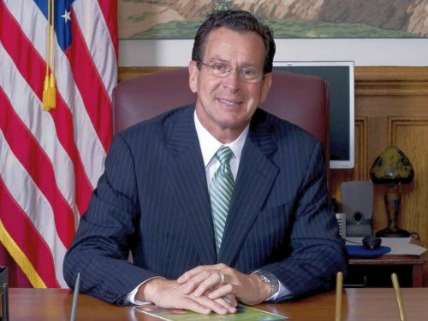Fearing 'Monsters' Like Total Wine, Liquor Sellers Want the State to Keep Prices High
Connecticut is the only state that sets minimum prices for wine and spirits.

In 2012 Connecticut Gov. Dannel Malloy persuaded state legislators to allow Sunday liquor sales, and last year he won approval of a law that allows liquor stores to stay open an additional hour. Now he is urging legislators to abolish a state-backed price fixing scheme that he says forces Connecticut drinkers to pay an extra $4 to $12 per bottle. In my latest Forbes column, I note that the debate over Malloy's proposal pits free-market Democrats against protectionist Republicans:
Last summer, when Pennsylvania's governor vetoed a bill that would have privatized liquor and wine sales in that state, he argued that inviting private businesses to compete for drinkers' dollars would raise prices. This week, as Connecticut legislators considered a bill that would eliminate minimum legal prices for liquor and wine, opponents argued that consumers would end up paying more as a result.
Alcohol sure makes people say funny things. In Connecticut's case, the liquor merchants who benefit from a 35-year-old protectionist scheme that discourages price competition want legislators to believe that system is good for consumers. And even though Connecticut is the only state in the country that sets minimum prices for liquor and wine, supporters of that policy act as if the alternative—allowing the market to set prices—is unthinkable.
"The whole purpose here, the whole result would be to give business to the box store who is trying to take over everybody's business in Connecticut," Carroll Hughes, chief lobbyist for the Connecticut Package Store Association, told the Associated Press. The trade group warns that abolishing minimum prices will drive half of the state's 1,150 liquor stores out of business, eliminating 2,100 jobs. "If we had a 2,100-employee company going belly up in Connecticut," Hughes said, "we'd be falling all over ourselves trying to help them survive."
Unlike Pennsylvania Gov. Tom Wolf, who parrots the self-interested talking points of privatization opponents, Connecticut Gov. Dannel Malloy is standing up for drinkers. "Why would government force residents to pay artificially high prices?" he asked in an interview with the Hartford Courant. "It's illogical and backwards. We need to be competitive with surrounding states, who have lower prices—and we need to let the market work instead of allowing backwards laws to remain on the books."


Show Comments (22)